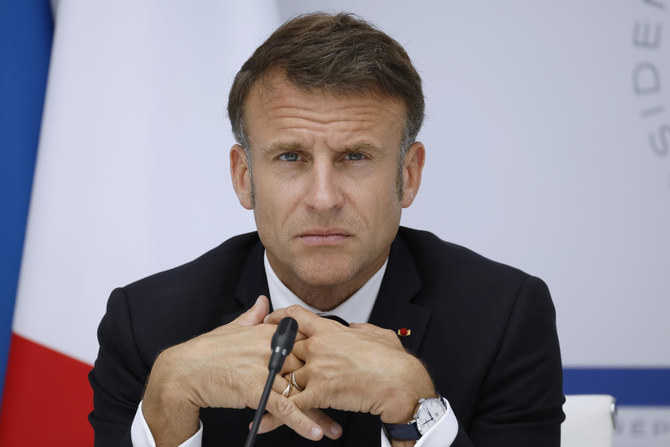PARIS: French President Emmanuel Macron will on Friday host the foreign ministers of four key Arab states for talks on the war in Gaza between Israel and Palestinian militant group Hamas, his office said.
Joined by his own top diplomat Stephane Sejourne, Macron will discuss the situation with Qatar’s Mohammed bin Abdulrahman Al-Thani, Egypt’s Sameh Shoukry, Ayman Safadi of Jordan and Saudi Foreign Minister Faisal bin Farhan Al-Saud, the Elysee said.
Macron to host Arab foreign ministers for Gaza talks
https://arab.news/4kea2
Macron to host Arab foreign ministers for Gaza talks

Pakistan president calls for facilitating trade, business interactions with Iraq

- President Asif Ali Zardari meets Caretaker Iraqi PM Mohammed Shia Al-Sudani in Baghdad
- Zardari calls for closer cooperation between chambers of commerce of both nations, private sector
ISLAMABAD: President Asif Ali Zardari recently called for facilitating trade and business interactions between Pakistan and Iraq to facilitate cooperation in key sectors of the economy between the two countries, Pakistani state media reported.
Zardari arrived in Iraq on Saturday for a four-day visit to the country aimed to deepen Pakistan’s bilateral ties with Baghdad. The Pakistani president met Iraqi Caretaker Prime Minister Mohammed Shia Al-Sudani to discuss practical measures to enhance bilateral cooperation, state broadcaster Radio Pakistan reported on Sunday.
According to the Press Information Department, Pakistan’s exports to Iraq totaled $54.29 million in 2024 while imports from Iraq, primarily petroleum products, amounted to $145.46 million the same year. Analysts have noted that these figures are modest, considering the market sizes and mutual interests of both nations.
“He [Zardari] highlighted priority sectors including information technology, agriculture and food security, construction, pharmaceuticals and medicines,” Radio Pakistan said.
“The president also stressed the importance of direct banking channels to facilitate trade, business interaction and the movement of pilgrims.”
Every year, thousands of Pakistani pilgrims travel to Iraq to visit some of the most revered shrines in Shia Islam, including the mausoleums of Ali in Najaf and Hussain in Karbala.
The scale of travel, often involving long stays and cross-border movements, has long posed logistical, security and migration-management challenges for Pakistani authorities and host governments alike.
The president called for improved facilitation for Pakistani pilgrims at immigration points, greater flexibility in emergency travel cases and measures to ease difficulties faced by pilgrims.
Zardari and Al-Sudani agreed on the importance of maintaining regular high-level exchanges to carry forward bilateral engagement. The Pakistani president spoke of Islamabad’s participation in major trade and health exhibitions in Baghdad, noting these engagements as a step toward sustained business-to-business connectivity.
“He encouraged closer coordination between chambers of commerce and the private sector of both countries through regular exchanges and virtual engagement,” Radio Pakistan said.
Zardari expressed satisfaction over the steady progress in bilateral defense ties with Iraq, including ongoing training programs and completed defense deliveries.
“He reaffirmed Pakistan’s willingness to further strengthen defense collaboration in line with Iraq’s requirements and evolving security needs,” the state media outlet reported.










